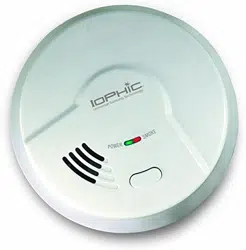Loading ...
Loading ...
Loading ...

TO DEACTIVATE THE LOCKING FEATURES: To remove the smoke alarm for cleaning or servicing
or to replace the battery, you must first remove the appropriate locking pin, if it has been installed.
1. Turn off AC power to the circuit.
2. Use long nose pliers to pull the locking pin out of the hole.
3. It is now possible to remove the smoke alarm or replace the battery.
WIRING INSTRUCTIONS:
1. a. The appropriate power supply is 120 Volt single phase power supplied from a non-switchable
circuit NOT protected by a ground fault circuit interrupter.
b. Turn off AC power to the circuit before wiring the smoke alarm.
c. There are three pigtail wires (black, white and yellow) coming from the AC QUICK
CONNECTOR. The proper wire connection is as follows:
WIRES FROM QUICK CONNECTOR CONNECT TO
BLACK "HOT" side of AC line
WHITE "NEUTRAL" side of AC line
YELLOW Interconnect wires of other smoke alarms
2. Insert the pin into the hole for the feature you are activating. Refer to the diagram below for
correct placement.
INSERT ALARM
LOCKING PIN HERE
INSERT BATTERY
LOCKING PIN HERE
DO NOT TAMPER WITH WIRES WHEN POWER IS ON!
For alarms that are used as single smoke alarms, do not connect the yellow wire to anything.
Insulate this wire (tape it) in place to make certain the yellow wire cannot contact any metal parts.
Interconnected alarms can provide earlier warning of fire than stand-alone alarms,
especially if a fire starts in a remote area of the dwelling. When alarms are inter- connected,
all alarms will sound when one alarm first goes into alarm. This alarm may be interconnected
with a total of not more than 24 interconnected devices, i.e., as many as 11 other USI
ELECTRIC or UNIVERSAL model smoke alarms or combination smoke and carbon
monoxide (CO) or smoke and carbon monoxide / natural gas alarms; 6 other initiating
alarms which may be a combination of USI ELECTRIC or UNIVERSAL CO Alarms and Heat
Alarms; and six other non-initiating devices such as USI ELECTRIC Relay Modules.
This alarm can be interconnected with the following models:
2995CN, 5304CN, MI100CN, MI106CN, MDS211CN, MDS201CN, 2985CN, 5303CN, MI200CN,
MI210CN, MDS101CN, MDS107CN, 3885CN, 3895CN, MP118CN, MP117CN, 3303CN, 3304CN,
MP202CN, MP212CN, MDSCN111CN, MDSCN103CN, MICN109CN, MICN102CN, MCN108CN,
MCN105CN, SS-785-CAN, SS-790-CAN, SS-795-CAN, USI-1103-CAN, USI-7795-CAN, USI-
7385, USI-7390, USI-7485, USI-7490, CD-9385, CD-9390, CD-9485, CD-9490, CD-9795-CAN,
CD-9785-CAN, and USI-960, RM-100 Relay.
When any one of these
interconnected models goes into alarm, it will trigger the
corresponding alarm within the interconnected system with respect to their sensing
capabilities. Natural gas detection is only present in models MDSCN111CN, MDSCN103CN,
MICN109CN, MICN102CN, MCN108CN, and MCN105CN, therefore a natural gas alarm will
NOT trigger the alarm of non- natural gas sensing models within an interconnected system.
The following alarms cannot reset units on an interconnected system: USI-7795-CAN, CD-
9795-CAN, CD-9785-CAN, USI-7385, USI-7390, USI-7485, USI-7490, CD-9385, CD-9390, CD-
9485, CD-9490.
The following alarms cannot trigger Quick Find
®
Alarm Origination on an interconnected
system: USI-7385, USI-7390, USI-7485, USI-7490, CD-9385, CD-9390, CD-9485, CD-9490.
The following alarms can trigger Quick Find
®
Alarm Origination, but will not indicate Alarm
Origination on an interconnected system: USI-1103-CAN, CD-9795-CAN, CD-9785-CAN, USI-
7795-CAN, SS-785-CAN, SS-790-CAN, SS-795-CAN.
The following alarms cannot be reset through an interconnected system because they do
not have Quick Find
®
Alarm Origination: USI-1103-CAN, SS-785-CAN, SS-790-CAN, SS-
795-CAN, USI-7385, USI-7390, USI-7485, USI-7490, CD-9385, CD-9390, CD-9485, CD-9490,
CD-9795-CAN, CD-9785-CAN, USI-7795-CAN.
Page 5
Loading ...
Loading ...
Loading ...
